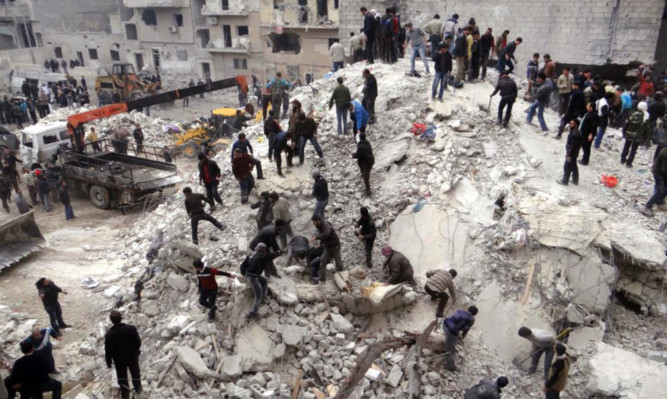Syrian television has broadcast images of what it said is the aftermath of an Israeli airstrike on a research centre near Damascus earlier this week, showing destroyed vehicles and moderate damage to a building.
Israel has not publicly acknowledged Wednesday’s airstrike that US officials said had hit a convoy of anti-aircraft weapons inside Syria bound for the militant Lebanese Hezbollah group.
The Syrian military said the target of the Israeli jets was a scientific research centre in the area of Jamraya, north-west of Damascus.
The strike raised tensions between Israel and its neighbour Syria, which is engulfed by a raging civil war.
The first purported images of the targeted site, aired by Al-Ikhbariya TV on Saturday, show the twisted and battered remnants of cars, trucks and military vehicles.
A building has broken windows and damaged interiors, but no major structural damage. The caption says: “Consequences of the Israeli aggression on the Jamraya centre”.
State TV also ran footage of the damage.
Syria’s regime vowed revenge for the airstrike while the rebels battling president Bashar Assad criticised him for not responding to what they termed Israeli aggression.
According to a US official, the strike targeted trucks containing SA-17 anti-aircraft missiles. The trucks were next to the research centre the Syrians identified and the strikes hit both the trucks and the building.
Advanced anti-aircraft missiles like the SA-17 in the hands of Hezbollah could change the strategic equation, which so far has allowed Israel to send warplanes over Lebanon practically unopposed.
The Syrian military denied that the target of the attack was a weapons convoy. It said low-flying Israeli jets crossed into the country over the Israeli-occupied Golan Heights to target the Jamraya centre.
Until Wednesday, Israel has been reluctant to do anything that would seem an intervention into Syrian civil war.
The airstrike adds another layer to the complexity of the Syrian conflict that has left the international community at a loss for ways to end bloodshed.
The uprising against president Assad began in March 2011 with largely peaceful pro-reform protests and developed into a civil war which the United Nations says has killed more than 60,000 people.
The Syrian Government maintains that there is no uprising in Syria but a conspiracy against the country because of its support for anti-Israeli groups.
